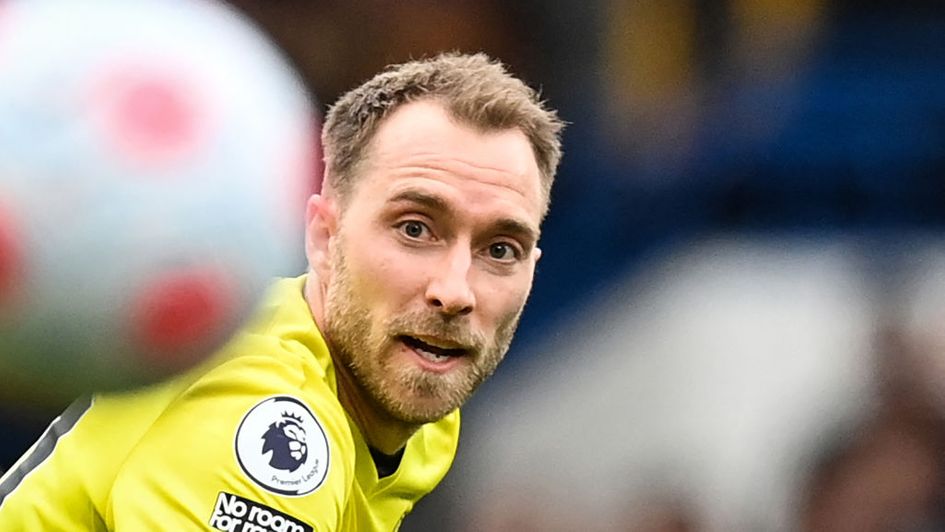Alex Keble lauds a brilliant Brentford display but cannot fathom Thomas Tuchel's choice of formation, while Manchester United are again under the microscope.
Surprise Tuchel formation allows Brentford to dominate
Brentford’s first victory over Chelsea since 1939 was one of the most shocking results of this Premier League season, and yet more surprising than the 4-1 scoreline itself is the fact Thomas Frank’s side were worthy of it. They played Chelsea off the park for long periods, swarming the hosts with some neat one-touch passing triangles that brought back memories of Brentford’s swashbuckling performances in the first few games of the campaign.
It could have been more than four. Christian Eriksen tore Chelsea to shreds with his passing, cutting them open on numerous occasions as he dictated the tempo from what amounted almost to a free role on the right side of Brentford’s midfield three. His elegance in possession was far superior to anything a flat and lacklustre Chelsea midfield could produce, and by the end Eriksen had touched the ball more times (54) than any other Brentford player.
In many ways this game was similar to Brentford’s 2-0 win over Arsenal on the opening day. As Arsenal had been in that contest, Chelsea were made to look frail and flat-footed (Hakim Ziyech and Timo Werner just couldn’t get into the contest, while Ruben Loftus-Cheek seemed lost in the middle) by Brentford’s unusual combination of aesthetic passing and bullish directness. Ivan Toney and Bryan Mbeumo bullied the Chelsea defence with their physicality, creating space with their runs and providing a constant to-feet option for the imperious Eriksen.
Thomas Tuchel must take the blame for what happened. It was a very strange decision to switch away from his usual 3-4-3 to a 4-3-3, not only because his players have had so little practice in the system – note how often the back four were pulled out of shape by Mbeumo and Toney – but because Brentford always use a 3-5-2. It is common for managers to mirror an opponent’s back three simply to negate its natural advantages in the central column of the pitch. It is completely unheard of to abandon your usual back three when coming up against another one.
Toney and Mbeumo were so effective because they could isolate Chelsea’s centre-backs two on two, while Chelsea’s forwards were stumped because Frank’s back three could easily cope with an isolated Werner. This was not Tuchel's finest hour.
Messy Man Utd are forever out of ideas
How on earth are one of the richest and most powerful teams in English football so completely devoid of meaning? Manchester United are the Premier League’s least understandable club; the side that stands for absolutely nothing under Ralf Rangnick. It was the same old story in the 1-1 draw with Leicester City, who were the better team in all phases of the game.
There is nothing about Rangnick’s 4-2-2-2 system that makes sense. They are disconnected horizontally and vertically, failing to create any rhythms of passing other than to shuffle the ball in improvisational fashion out to the wingers. It is no wonder Leicester could dig in, hold tight, and make this a tedious match.
Leicester seemed content with playing for the draw, rarely committing bodies forward or taking risks in their pressing game, and that left United looking as static as ever.
However, the most important reason for the dearth of quality in the first hour was Rangnick’s decision to use Bruno Fernandes and Paul Pogba as dual false nines, as he had done in the 4-1 defeat to Manchester City. As in that game, it meant United had no runners in behind to stretch Leicester or create any attacking momentum.
Rangnick changed the pattern of the game with the introduction of Marcus Rashford for Scott McTominay in the 55th minute, moving Pogba into a midfield two. Immediately Pogba sprayed a long ball over the top to find Rashford’s run and the match opened up; proof Rangnick’s initial selection was a mistake. But the knock-on effect of having Pogba in the middle – and an eager runner up front – was to stretch the game, so that as soon as a United attack broke down, Leicester had the chance to counter in the other direction.
This is precisely what happened for Leicester’s opener – and on several more occasions in the final half hour. The visitors had the better chances and could easily have won all three points.
The main takeaway is that United were disordered, chaotic, and out-played when the game was stodgy and when the game was stretched. They got almost nothing right. United cannot hire a new manager quickly enough.
Klopp’s rotation could have cost Liverpool
If Liverpool win the title, the story told of their season will include the passage of play in the 22nd minute at Anfield today when Juraj Kucka had a one-on-one saved by Alisson Becker and Liverpool opened the scoring 34 seconds later. Matches and seasons hinge on moments like this. From a tactical perspective, it’s important to realise just how easily Liverpool could have gone 1-0 down and dropped points in what was a sloppy, below-par performance.
Jurgen Klopp understandably felt the need to rotate ahead of a huge fortnight of football, but he got the balance wrong. On the right side, combining Curtis Jones with Joe Gomez meant Liverpool could not build the speed or fluency to give Mohamed Salah the ball in dangerous situations, while the left side was shut down by the fact Diogo Jota invariably drifts into central positions.
He does not work well with Roberto Firmino, mainly because they tend to want to occupy similar spaces, and Roy Hodgson’s defence found it fairly easy to keep track of these two. If Klopp is to keep leaving big names out of the starting 11, he needs to do so a bit more carefully than he did here. He is lucky that things panned out in Liverpool’s favour.
